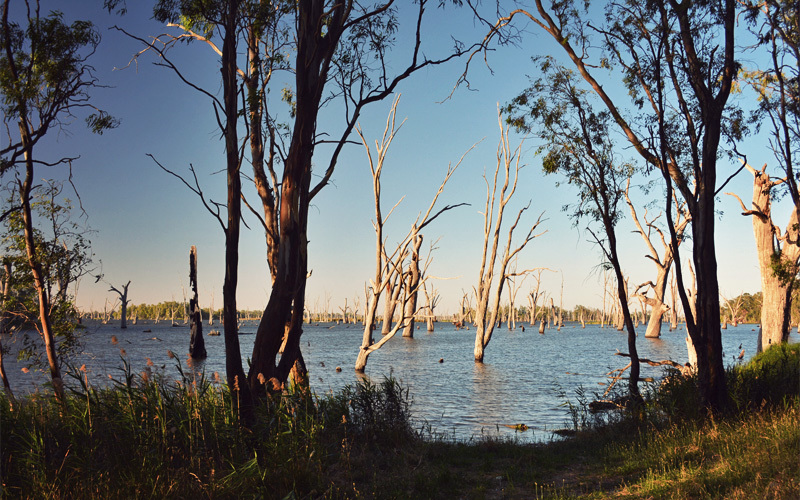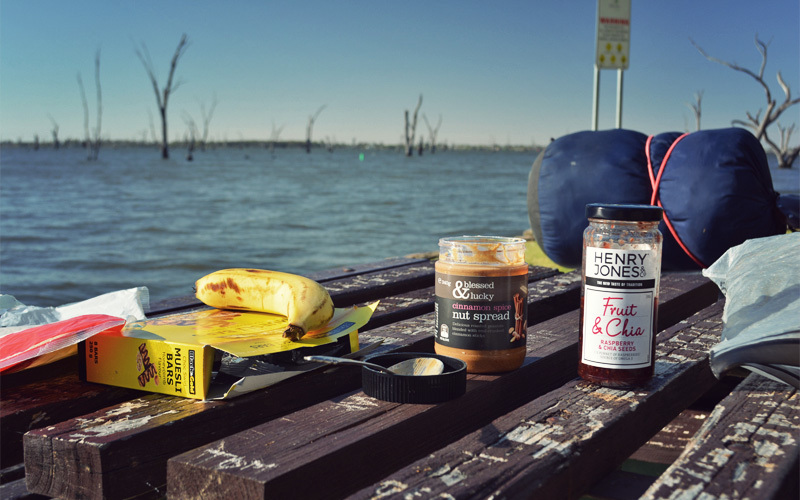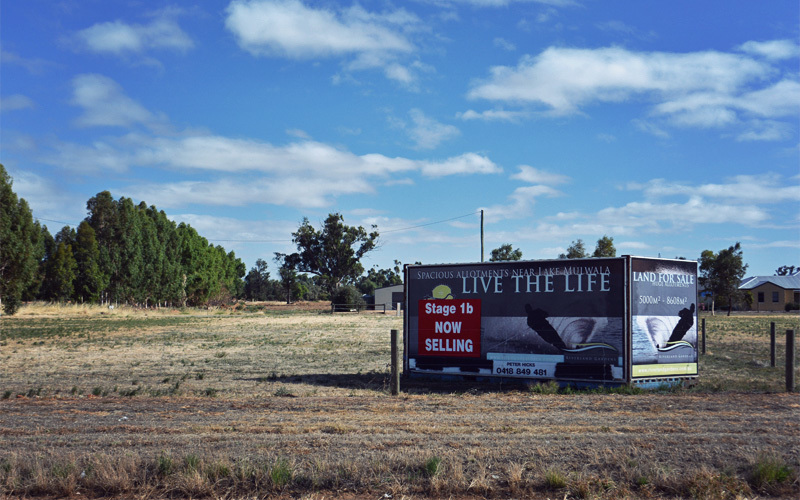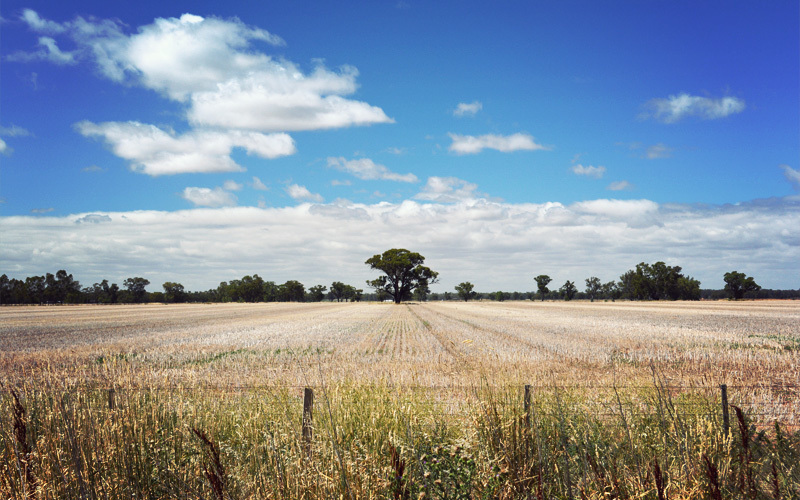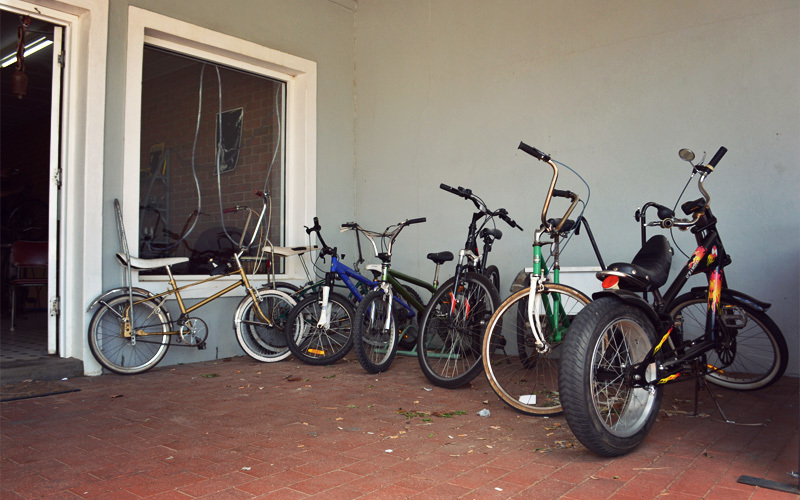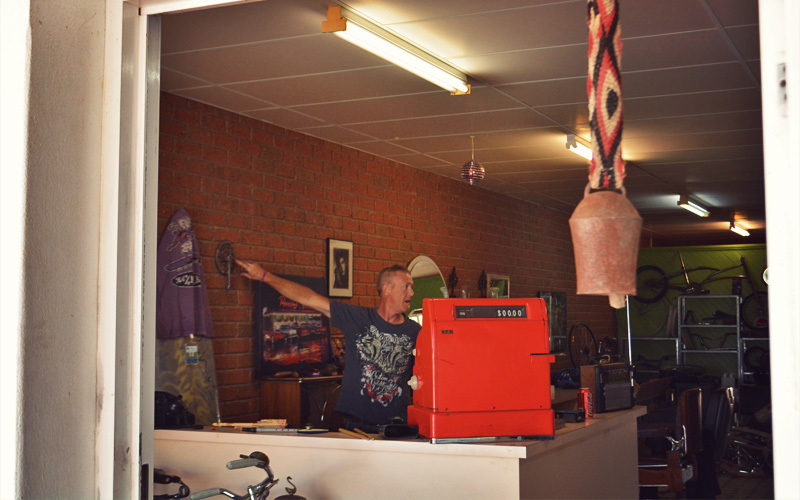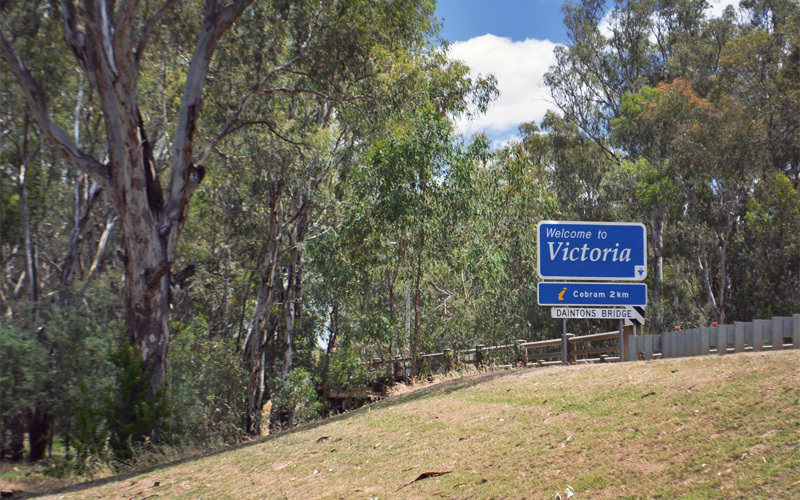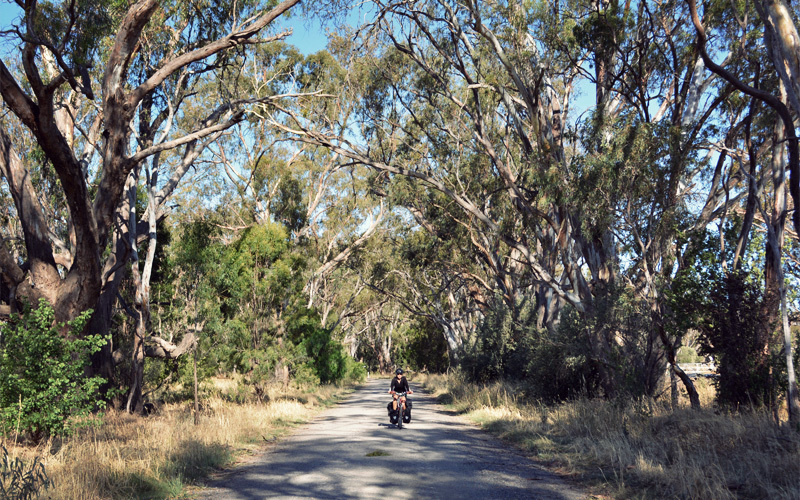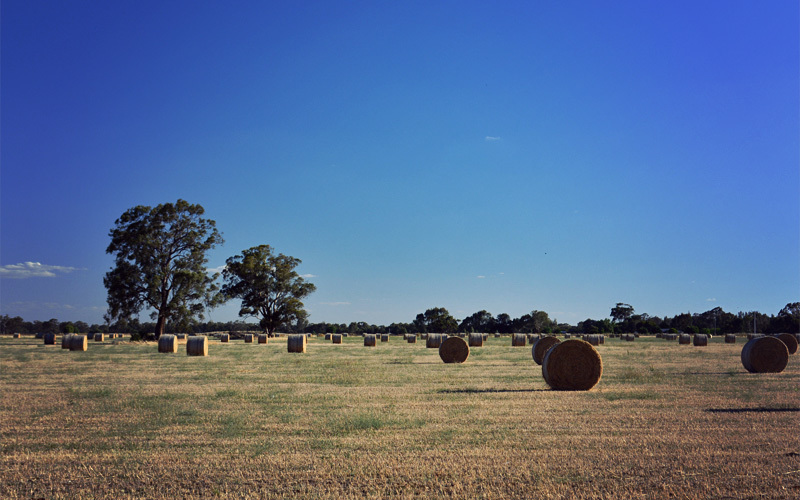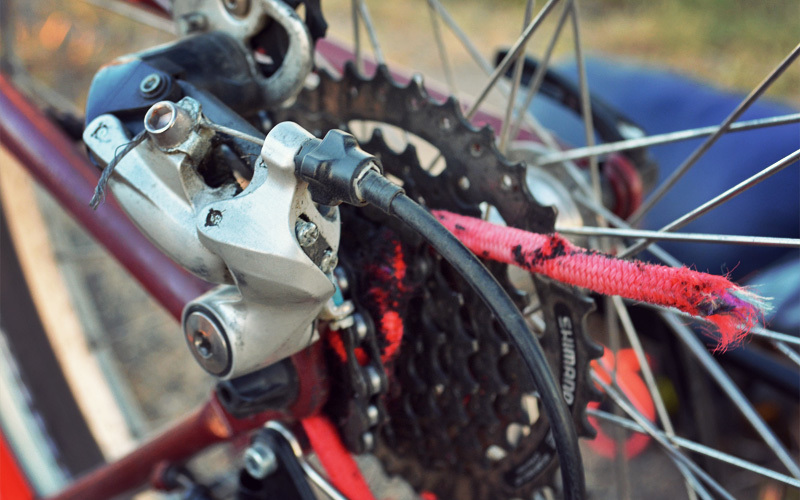December 30, 2014
Day 126: Collendina State Forest to Katunga, VIC
Australia is quiet and dark and windless when we wake up at 5:00. But within minutes the kookaburras have come alive, turning the world into a chorus of hoots and whoops. By the time we start riding forty-five minutes later the cockatoos have replaced them, knocking each other off the branches above, chasing each other across the sky, and screeching and crying all the while. Soon after, we feel the hand of the wind pressing against our faces and our bikes, followed in short order by the warmth of the sun hitting our necks and backs as it crawls up over the horizon. The new day has dawned and everything is as it should be.

| Heart | 1 | Comment | 0 | Link |
We spend much of the early morning along the edge of Lake Mulwala. Up until seventy-five years ago it was forest and farmland, but then a dam was built near the end of it, the water backed up and boom, brand new lake. With some lakes there's a question about whether or not they're man made, but here there isn't any doubt. No matter where you look, hundreds of dead gum trees with ash-colored trunks reach out from below the surface like outstretched arms and hands grasping for the sky, as if they're looking for someone to pull them to safety. Despite the navigation hazard that goes along with hundreds of trees sticking out of the lake, and the untold number of stumps that must loom all over the place, the ramps near the edge of the road are jammed with white-colored utes backing down toward the water and launching a small armada of cheap aluminum fishing boats.
The cold of the morning joins with the wind to turn our fingers numb and send us shivering. It's further proof that anyone who tells you riding across Australia in the summer is stupid idea because it's going to be hot all day, every day — so hot that birds will start falling out of the sky, so hot that your tires will start to melt into the road below you, so hot that the water in your bottles will start to boil — is full of shit.
We wave to passing drivers and we wave as we pass by the cows. We ride by huge areas of native forest off to our left, and we look over into the swampland and its many shades of deep green and wonder what kind of wildlife might call that kind of place home. We watch the dark gray halos of cloud shadows move slowly across the shapeless terrain of fallow fields on our right. We give happy, friendly, optimistic voices to the poisonous spiders that we imagine live in the hollows of the trees sprinkled throughout those fields. We curse those goddamned motherfucking flies as they shoot into our ears and up our nostrils every time we stop for more than four seconds.
With the winds, the flatness, the agriculture, the twenty to twenty-five miles between towns, and the fact that every town and every hill appear half an hour before we reach them, this part of Australia reminds me of cycling in Kansas. And that's a wonderful thing, because I have so many fond memories of traveling through the state on the TransAmerica Trail on my ride across America back in 2011.
Unlike Kansas, the fast food counter attached to the mini-mart and gas station in Barooga sells things like a snitzel sanga, flake and chips, a Kiev ball, a chicken crackle, a wing ding, and something called a dim sim. I eat my flake at plastic table around the side of the building, next to the entrance to what might be the world's only combination barber and bicycle shop. A forty-something guy with a soul patch below his bottom lip and a pair of reflective shades resting on the bridge of his nose stands in the doorway of the shop, pounding a fat nail into the top of the door jamb, down from which hangs a big rusted steel cowbell-type thing.
Moments later, he walks over and asks if he can sit down with us, and we say Yes, of course. His name is Grant, and he's the guy who sells bikes and cuts hair in Barooga. He has a lot of thoughts about the area and he's happy to share.
"You wouldn't believe the difference between here and just over the other side of the river," he says. "Here in Barooga it's about 3,000 people; small, you know, a few shops, everyone knows each other. But over there it's about 7,000 and there's a lotta problems with crack and ice and stuff, which the police aren't doing anything about, even though you ask every other person and they'll tell you where it's coming from. But anyway, there's shop after shop after shop, and all those people. I can't stand cities. I live out here in the country, paid $88,000 for a house on an acre, grow my own vegetables, and if I do three haircuts a day here I'm comin' out ahead. I coulda closed up shop by nine this morning, but I like the work, I like the people, ya know?"
"How'd you happen to end up here and not somewhere else?" I ask him.
"Well, my grandpa was born here and my mom was born here. But my dad was a bank manager, so we moved every three years. One day he was like, 'Hey, we're moving again,' and I'm like, 'Well, I'm not.' I lived in England for awhile, met a Spanish girl and lived in Spain for awhile. Got a one-way ticket to Kathmandu and hiked around Nepal for a few months. Lived in a lot of places, really. But I like it here. The country life, ya know? And I've got a four-year-old, so there's that."
It's a frenetic conversation with little pattern or structure to it. Sometimes that's for the best.
"A long time ago I used to run up to Sydney with like $10,000 and pick up 500 pills and bring em back down here," he says to us unprompted. "They weren't for me, I didn't even use em, ya know? Everyone else paid and I was just pickin' em up. Something about it though; the thrill, ya know? Not so good when I almost got the ten grand knicked off me and I got chased by a couple of shifty Asian guys with knives. That kinda got me goin'. But hey, look at this bike over here. This thing is fast. I was ridin' the other day without a helmet, and the cop comes up behind me and blips the siren, ya know? So I flip a u-turn, give it six hard pedals, and man I'm flying. I head back this way, make a hard turn, fly through the front door of the shop right there, go all the way through and then out the back door and I'm gone before he can even turn around to come get me."
While we're processing this, a husband and wife and their son walk into the empty shop, and Grant gets up and follows them in. As we finish off lunch he cuts the kid's hair, explains the finer points of the antique cash register and the classic bikes inside to the parents, and twice walks forehead-first into the bell — which he told us is a Tibetan yak bell — that he hung in the door frame just fifteen minutes before.
You meet a lot of eccentric people traveling through small towns, whether you're in America or Australia, and probably in Burma or Nigeria too. Almost all of them are harmless and interesting and worth spending a few minutes or hours talking with, but a good percentage of them are also full of stories that, if not entirely untrue, have more made-up qualities to them than fact. I don't get that feeling from Grant. He's a guy who's seen some stuff and who's done some stuff that most of us never have and never will, but who has also managed to stay just on the right side of sane. He's clear enough in his thoughts to be creative and freewheeling, but he's never lost the unwillingness to bind himself to the kind of life that most people are told they have to live. He tells us as much.
"I wouldn't change a thing about the way my mind works," he says as we get ready to climb back on the bikes. "Because then I wouldn't be me, and I wouldn't have done all of the things in life that I have."
We don't see any crackheads during our afternoon in Cobram, although we hang out in McDonalds and not some dark bedroom in a rundown little house, so maybe that's why. Not far out of town we leave the pavement behind and travel down a country road where the branches and leaves of the trees form a canopy over the road. It's a mix of dirt and gravel and also sealed sections that stopped being maintained thirty or forty years ago, and the character of the surface changes at every four-way intersection. It takes us past apple and plum orchards, calves feeding on hay bales the farmer dropped into their paddock ten minutes before, and road signs that read Give Way to Stock. Dust clouds signal the approach of cars and farm trucks long before they arrive.
Our goal is to reach forested land near the banks of the Murray River about twenty miles west of Cobram, but the headwind that's been our third team member for the last two days blows strong and straight into our faces. Despite cranking hard and having a strong desire to get there before darkness falls, with each passing minute it becomes clear that there just isn't enough light left to make it happen. And so rather than end up in pitch black among a sea of barbed wire fencing and dairy cows, we divert south and head toward the thousand-person town of Strathmerton.
Just after we roll into town my front tire goes soft. It's the second flat of the afternoon, and like the first one there's no obvious hole in the tube that I can patch. With no other options I pull out the box that holds my last spare tube and get to work on installing it, something that now feels like a big risk as we seem to have entered thorn country. As I manhandle a tube that seems to have shrunk since I bought it more than three years ago, a carload full of hillbillies dump armloads full of garbage in the general area but not inside of the dumpster behind us, with crazy-sounding laughter and accents so thick we can't make out what they're saying. We'd considered camping at the nearby sports pitch before we arrived, but Strathmerton is a small town on a main highway, next to a train line, with run-down-looking houses and drugged-looking people walking the sidewalks between them. We both get a bad vibe from it, and we decide to push on six miles to the next town in the failing daylight instead.
We make it exactly a mile before Kristen comes to a sudden stop with the rear wheel locked up and the tire skidding. One of the long red bungee cords that holds the sleeping bag in place on the rear rack has split. Half of it has fallen down into the chain, wrapped itself around the face and back side of the cassette, and wedged in between the spokes of the wheel. My first thought is, Well, we're fucked. It's a rare day when something flies into the drivetrain while it's spinning at thirteen miles per hour and nothing bad comes of it. But we get to work anyway, taking all of the bags off the bike and flipping it over. Using Kristen's Leatherman tool we saw the mass of cord into smaller pieces, then pull them free with the pliers as we wind the wheel backward to relieve the tension, with cows crunching away at the dry yellow grass next to the fence line on the other side of the road. When I inspect the freed-up chain, cassette, derailleur, hub, and spokes, I find nothing broken, bent, or cracked. It could have been so bad, and yet it ends up not bad at all. The worst we can say is that we're now minus one tired old red bungee cord.
We rave about our good fortune as we continue on with the best riding we've had in several days. We watched the sun come up from the seat of the bike this morning, and it turns out that we also get to watch it set as well. With our two headlights cutting through the black we roll into Katunga, population 300. In the darkness we sit at a picnic table at a tiny park that lies at the center of town, eating bread and hummus, and bread with peanut butter and jam. Down the block we see a store that's also the post office, but there's nothing else around except modest one-story houses.
After eating we set up the tent behind two small rows of bushes that mostly hide us from view. Inside we listen to little dogs bark, watch headlights from passing cars illuminate the tent for a fraction of a second at a time, and feel the wind that we hoped had died return and start to whip the sides of the rain fly around. The only other light is the from inside the Telstra telephone booth that stands behind our heads. Tired from cranking against the wind all day, we fall to sleep as soon as our heads hit our smelly towel-pillows.
Today's ride: 63 miles (101 km)
Total: 3,839 miles (6,178 km)
| Rate this entry's writing | Heart | 3 |
| Comment on this entry | Comment | 0 |
